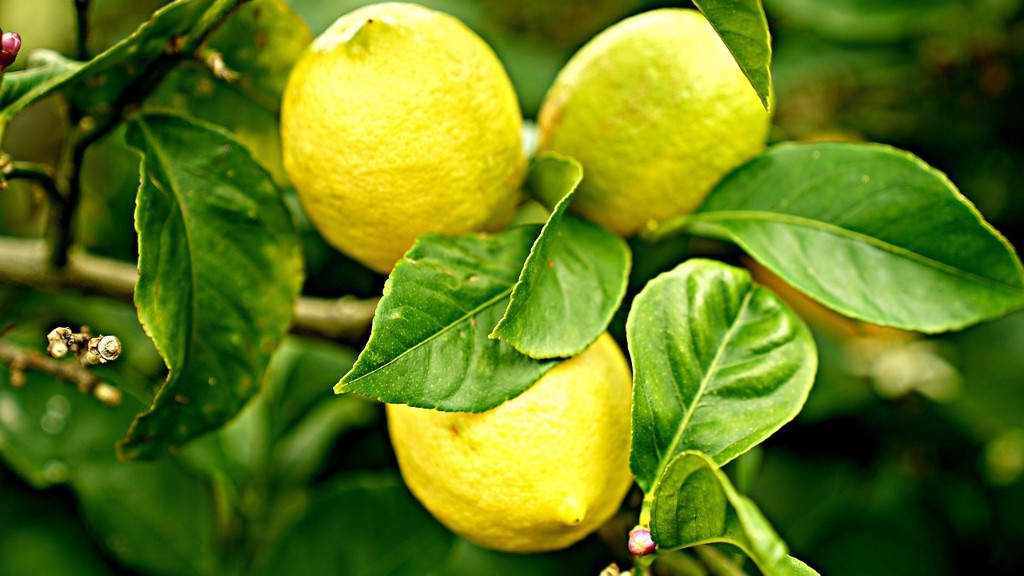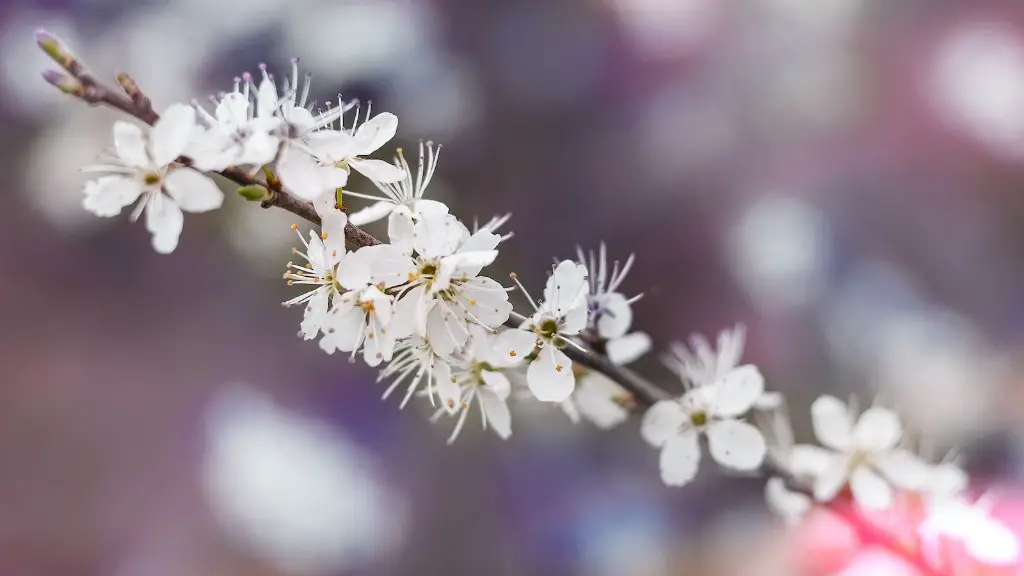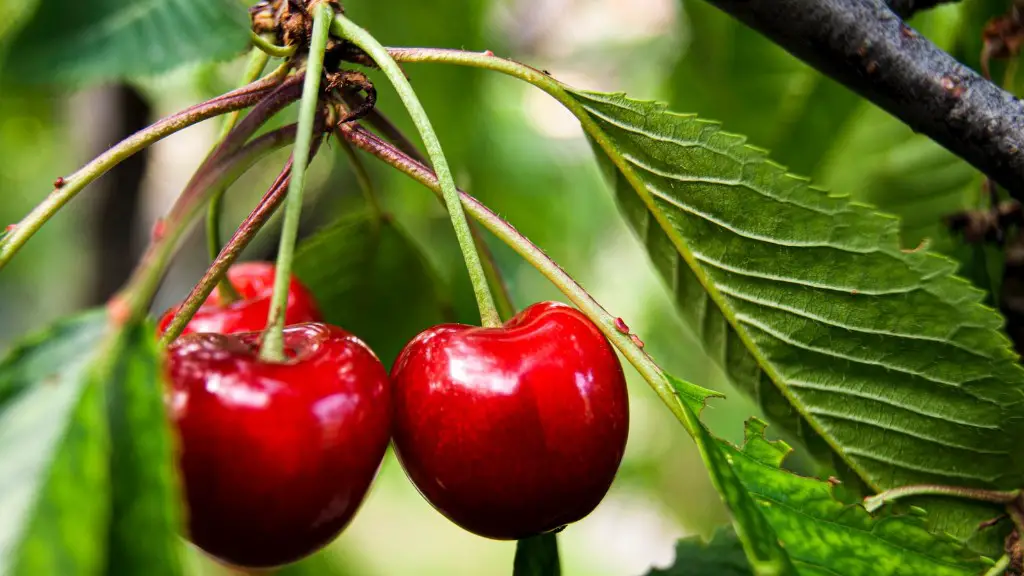The Meyer lemon tree is an attractive small citrus tree with a spreading growth habit and beautiful copper-colored foliage. It can grow up to 15 feet tall, but usually only reaches 8 to 10 feet in height. It is a popular indoor plant and is also used as an ornamental tree in gardens. When grown in a container, the Meyer lemon tree does not tend to reach the same height as it does in the ground.
Meyer lemon trees require warm conditions to grow and should be protected from the cold. They should ideally be planted near a sunny window or in a room with a warm temperature throughout the year. A mature tree can handle temperatures down to about 15°F, but it is still better to try and keep the temperature above freezing.
To ensure that the Meyer lemon tree reaches its full height, it needs to be pruned regularly. Pruning helps to maintain the desired shape and size of the tree and also encourages it to produce fruit. Pruning should be done in late winter or early spring when the tree is in its dormant stage. Remove any dead or damaged branches, as well as any branches that are crossing or rubbing against each other.
In order to get the most out of your Meyer lemon tree, it is important to ensure that it receives the right amount of fertilizer. Fertilize the tree in early spring and then again in mid-summer. Use a citrus fertilizer that is high in nitrogen, phosphorus, and potassium to give the tree the best chance of reaching its full height.
Watering is another important factor when it comes to height growth for the Meyer lemon tree. The tree should be watered regularly during its growing season. However, be careful not to overwater it. Too much water can cause root rot and inhibit the growth of the tree. The soil should remain moist, but not overly damp.
Given the right conditions, a Meyer lemon tree can reach heights of 15 feet or more. By providing the tree with the right type of soil and providing it with proper watering, fertilization, and pruning, it can reach its full height potential.
Growing Meyer Lemons Outdoors
Meyer lemon trees can be beautiful and productive additions to any garden. However, before planting, you must consider the geographic location and soil conditions of the area. For maximum growth and production, choose a location that has plenty of sun and well-draining soil. If the soil is heavy and tends to stay wet, you may need to add organic matter and improve drainage. Planting in a raised bed can also help with drainage.
Once planted and growing, Meyer lemon trees require very little maintenance. Water is the most important factor and should be provided in the right amounts. Be sure to water the tree at least once a week. If there are extended periods of hot, dry weather, water the tree more often.
Fertilizer should also be provided on a regular basis, in order to encourage healthy growth and maximize fruit production. A nitrogen-rich fertilizer should be applied every six to eight weeks during the growing season. Always follow the directions on the fertilizer packaging.
For optimal growth, it is also important to maintain your Meyer lemon tree. Prune branches and stems to encourage a balanced and healthy structure. This will help the tree reach its full height potential and allow light to reach the inner parts of the tree. Pruning should also be used to remove any diseased or dead wood.
By providing your Meyer lemon tree with the necessary sunlight, soil, water, and fertilizer, it can reach heights of 8-15 feet or even taller. Keep in mind that it may take several years for a tree to reach its full size.
Pests & Diseases
Meyer lemon trees are relatively disease and pest resistant, but that doesn’t mean they’re immune to problems. Being aware of potential pest and disease problems is key to keeping your tree healthy and helping it reach its maximum potential. Some of the most common diseases affecting Meyer lemon trees include root rot, anthracnose, and scab. To prevent problems, practice good sanitation and keep a close eye out for signs of disease or damage.
In terms of pests, the most common ones include aphids, scales, mites, and mealybugs. These can be identified by their characteristic clusters of small sap-sucking insects on the leaves and stems of the tree. If present, they can be controlled through the use of an insecticidal soap or horticultural oil. Be sure to apply during the dormant season to prevent any harm to beneficial insects.
Mature Meyer lemon trees can become quite tall. While this is generally an advantage, it can sometimes lead to issues with wind damage. To protect your tree from high winds, consider placing a windbreak around it or planting it in a sheltered location. Always check for structural damage immediately after strong winds and take the appropriate measures to repair or protect the tree.
To get the most out of your Meyer lemon tree, proper care and maintenance is essential. By providing proper amounts of sunlight, water, and fertilizer, pruning appropriately, and keeping an eye out for pests and diseases, you can help your tree reach its full height potential.
Harvesting & Preserving Meyer Lemons
Meyer lemons have thin skin that turns yellow when ripe and has great flavor. They can be harvested anytime throughout the year, but the optimal time to pick the fruit is when the skin has turned yellow and the flesh is still slightly soft. Be sure to use garden clippers or a picking pole to avoid damaging the fruit.
The fruits should be stored in a cool, dark place and can last for up to two weeks. For longer storage, consider preserving them in brine or freezer bags. Meyer lemons can also be processed into a variety of products such as marmalade, jam, or juice.
When harvesting your Meyer lemons be sure to pick the fruits when they are ripe. Pick those that have yellowish, thin-skinned fruits that are slightly soft to the touch. If the lemons are still green, they will not be as flavorful or sweet. Green fruits can be left to ripen, but be sure to check them often.
Meyer Lemon juice can also be frozen and stored for future use. This can be done with freshly squeezed juice or the juice from canned or jarred Meyer lemons. For freezing, pour the juice into ice cube trays and freeze overnight. The frozen juice cubes can then be stored in an air-tight container for several months.
When preserving, it’s also important to protect the lemon from oxidation. To prevent oxidation, Meyer lemons can be covered in sugar syrup or lemon juice. This will help protect the color and flavor of the lemons and make them last longer.
By harvesting the Meyer lemon fruits when ripe and properly storing and preserving them, you can make them last for months and enjoy the flavor for much longer. Proper care and maintenance of the tree is also essential in order to ensure the tree reaches its full height potential and produces quality fruits.
Adding Meyer Lemons To Your Diet
Meyer lemons can be used in a variety of ways to add flavor to your diet. Their thin skin and sweet flavor make them ideal for juicing and adding to dishes. They can also be used in baking cakes, pies, and muffins, as well as in drinks. And of course, their juice can be added to salads, meat and fish dishes, sauces, and dips.
Meyer lemon juice is high in vitamin C and is thought to be a digestive aid. It is also often used as a detoxifier and can be added to a glass of warm water or green tea for added flavor and health benefits. Drinking a glass of Meyer lemon juice first thing in the morning is said to have many benefits.
In addition to using their juice, Meyer lemons can also be used for their zest or herbed roasted or grilled. The juice and zest are often added to salads and main dishes, as well as drinks and desserts. When grilling or roasting, slice the Meyer lemons into thin rounds and coat them with olive oil, herbs, and spices. When added to dishes, they add a fresh, citrusy flavor.
The Meyer lemon tree is an attractive and productive addition to any landscape. By providing the tree with the right growing conditions, you can ensure that it reaches its full height potential and continues to produce high-quality lemons. And by adding the lemons to your diet, you can experience their flavor and reap the many health benefits they offer.



